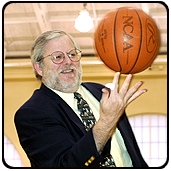‘Coachtalk’ gives teams ‘second season,’justifies wins and losses at NCAA Tournament
 Whether they win or lose in the NCAA Division I men’s basketball tournament, the coaches there will follow predictable patterns in what they say after the game, according to a Wake Forest University professor. He calls it coachtalk.
Whether they win or lose in the NCAA Division I men’s basketball tournament, the coaches there will follow predictable patterns in what they say after the game, according to a Wake Forest University professor. He calls it coachtalk.
“After a while, if you listen to enough coaches, you begin to think you’ve heard it all before,” says John Llewellyn, an associate professor of communication who has studied this topic for nearly two decades. “And the odds are, you have.”
Llewellyn analyzed the professional language of Division I men’s college basketball coaches for “Coachtalk,” a chapter that will appear in the book “Case Studies in Sport Communication,” scheduled for release this year by Praeger Press. Llewellyn’s research revealed four recurring themes that both winning and losing coaches employ. “Coachtalk” discusses their use and examines the reasons behind them.
Llewellyn says coachtalk reveals an underlying respect and regard that coaches have for each other and for the social world of athletics — a world where competition can be fierce. Coachtalk also allows for the idea of a “second season” at tournament time.
“Tournament time is a great chance for rededication and renewal, even though teams have played 30 games by the time this Œnew season’ comes around,” says Llewellyn. “Coachtalk is the language coaches use to generate hope and explain outcomes. It sustains the culture of sports.”
Llewellyn studied newspaper reports of post-game comments made by the winning and losing basketball coaches in 12 NCAA men’s national championship games every other year from 1976-2000. Coaches in this group included Indiana University’s Bobby Knight, University of North Carolina’s Dean Smith, Duke University’s Mike Krzyzewski, Michigan State University’s Tom Izzo and University of Florida’s Billy Donovan, among others.
Llewellyn discovered a pattern in what each winning coach said and what each losing coach said after the game.
Winning coaches elevated all aspects of the game, while remaining humble. They also reinforced the traditional values of sport, while acknowledging their suffering throughout the season.
Losing coaches deferred to the winners, while subtly giving their fans an alternate definition of winning such as, “It’s just an honor to be here.” Losing coaches also often credited the outcome to fate, while acknowledging that they suffered from the loss.
“Fans want the coach to explain things in terms they can understand,” Llewellyn says. “The scoreboard is only the beginning. Giving flavor to the outcome is how you make it as a coach.”
Llewellyn points to Izzo’s reaction after the 2000 championship game against the University of Florida as an example of expressing excitement in the context of humility: “This is more overwhelming than I thought it would be, if you want the truth,” Izzo told reporters after the game.
Many winning coaches also confess the suffering it took to get to the top and adopt a “winning is not everything” attitude, Llewellyn says. However, he points out that the rhetorical rules of coaching, which he calls coachtalk, mean that only winners can say that winning is not everything; others who make the claim show a defective attitude.
The most consistent theme with losing coaches is acknowledgement of the winner, or deference, says Llewellyn. Deference not only acknowledges the winner, but also shows the losing coach’s respect for the social order of competition.
Johnny Orr, former coach at the University of Michigan, illustrated it in 1976 when his team lost by 18 points to Indiana University. “They are a great team. There is no doubt they are number one,” Orr said after the loss.
Llewellyn also found that losing coaches are in the position of justifying on-court judgments, often in terms of fate.
After his team’s 30-point loss to University of Nevada-Las Vegas in 1990, Duke Coach Mike Krzyzewski said, “We were our best in March. This game was in April, huh?” After a loss to the University of Louisville in 1980, former UCLA coach Larry Brown told reporters, “We had our chances and we had a lot of good shots early that wouldn’t go down.” Both coaches subtly attributed their defeat to forces beyond mortal control, Llewellyn says.
Losing coaches also redefine the loss, providing an explanation for the heart of the fan — not an accounting for the numbers on the scoreboard, Llewellyn says. In 1996, following Syracuse University’s loss to the University of Kentucky, coach Jim Boeheim said, “Too much is made about losing, but to my way of thinking we didn’t lose anything tonight.”
Llewellyn says the “Coachtalk” chapter gives an explanation for what most sports fans have noticed for years.
“The meaning of winning is constructed and re-constructed with each win or loss,” Llewellyn says. “Coachtalk is really a social system where both sides — winners and losers — talk in a way to create and maintain each other.”
Llewellyn, who joined the Wake Forest faculty in 1990, became interested in the concept of coachtalk as a college student when his school’s football coach talked his way through 12 consecutive losses. He started his initial research in 1985, when he was working on his doctoral degree at the University of Texas at Austin.
However, Llewellyn admits to observing the phenomenon of coachtalk much earlier, when as a high school basketball player his team earned a 2-19 overall record.
“The beauty of that experience is that I have two wonderful and clear memories of that season,” Llewellyn says.
Categories: Happening at Wake, Research & Discovery
Media Contact
Wake Forest News
media@wfu.edu
336.758.5237



